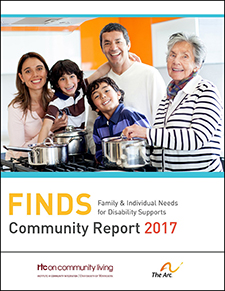MN UCEDD Collaborates with The Arc on FINDS Report Revealing Caregiver Stress
August 9, 2018

|
In 2017, the Research and Training Center on Community Living (RTC/CL) at the Institute on Community Integration (MN UCEDD) conducted an online survey in collaboration with The Arc of the United States in order to better understand the status of family caregivers of individuals with intellectual and developmental disabilities (I/DD) in the U.S. Known as the Family & Individual Needs for Disability Support (FINDS) study, the survey and newly released FINDS Community Report 2017 shed light on the experiences of families who provide supports to a family member with I/DD.
"Participants in the FINDS study reflect the ever-increasing reliance on families to provide the bulk of supports to individuals with IDD," notes lead author, Lynda Lahti Anderson of the RTC/CL. The workforce crisis and lack of supports such as respite can challenge both the caregivers and the individuals receiving supports. Caregivers reported economic stresses such as needing to quit work, reduce hours, or turn down promotions in order to provide care, as well as impacts on their own health and well-being. Compounding the reliance on families to provide long-term supports is the aging population of cIn 2017, the Research and Training Center on Community Living (RTC/CL) at the Institute on Community Integration (MN UCEDD) conducted an online survey in collaboration with The Arc of the United States in order to better understand the status of family caregivers of individuals with intellectual and developmental disabilities (I/DD) in the U.S. Known as the Family & Individual Needs for Disability Support (FINDS) study, the survey and newly released FINDS Community Report 2017 shed light on the experiences of families who provide supports to a family member with I/DD.
"Participants in the FINDS study reflect the ever-increasing reliance on families to provide the bulk of supports to individuals with IDD," notes lead author, Lynda Lahti Anderson of the RTC/CL. The workforce crisis and lack of supports such as respite can challenge both the caregivers and the individuals receiving supports. Caregivers reported economic stresses such as needing to quit work, reduce hours, or turn down promotions in order to provide care, as well as impacts on their own health and well-being. Compounding the reliance on families to provide long-term supports is the aging population of caregivers. "One of the primary roles of families has always been to provide support and care to family members," says Anderson. "The results of the FINDS survey highlight the scope, intensity, and duration of the supports provided family members, particularly parents, of both children and adults with intellectual or developmental disabilities. Policies that support family caregivers to reduce economic and other impacts are critical."
Anderson's co-authors on the report were Amy Hewitt (RTC/CL), Sandra Pettingell (RTC/CL), Amie Lulinski (Coleman Institute for Cognitive Disabilities, University of Colorado), Marianne Taylor (Consultant), and John Reagan (RTC/CL).aregivers. "One of the primary roles of families has always been to provide support and care to family members," says Anderson. "The results of the FINDS survey highlight the scope, intensity, and duration of the supports provided family members, particularly parents, of both children and adults with intellectual or developmental disabilities. Policies that support family caregivers to reduce economic and other impacts are critical."
Anderson's co-authors on the report were Amy Hewitt (RTC/CL), Sandra Pettingell (RTC/CL), Amie Lulinski (Coleman Institute for Cognitive Disabilities, University of Colorado), Marianne Taylor (Consultant), and John Reagan (RTC/CL).







